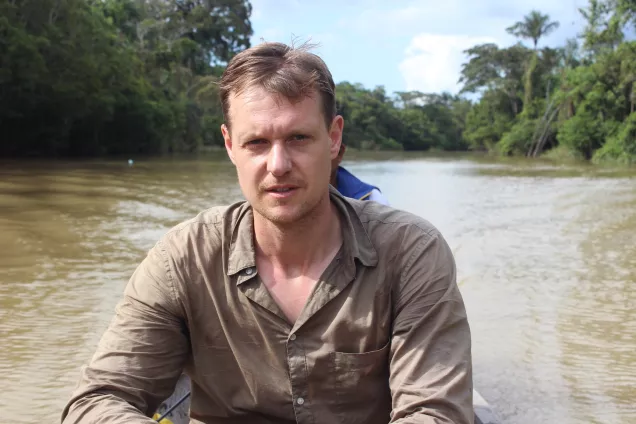– Some environmental human rights defenders, such as those in Germany, take the law into their own hands, by, for example, occupying land or buildings. Does that mean their actions are wrong? What they are doing is perhaps the right thing to do, seen from the perspective of morality, the environment and future generations, says Torsten Krause, senior lecturer at Lund University Center for Sustainability Studies, LUCSUS.
Torsten Krause is leading a newly started research project which will shed light on the various moral and legal dilemmas that can arise in the fight to defend and protect nature and human rights. It brings together researchers in sustainability science, political science, geography and law to make a global survey of environmental human rights defenders. Part of the research is based in Colombia, where the struggle to protect nature is associated with danger to life, and dozens of environmental human rights defenders are murdered every year. Key research questions include: who chooses to take on this role, what motivates them, and what do they protect? What tools and strategies do they use in their struggle with states, corporations and armed groups?
– The struggle of environmental human rights defenders can look very different depending on where in the world they are based. Often the struggle is about protecting a forest, a river or an area of land, but it is also about protecting and defending the right of people to live according to their own cultural traditions. We want to follow these people to get a picture of their situation, and the threats they face. What role do they play as change agents, and how do they contribute to preserving cultural and biological diversity as well as supporting our common battle against global climate change?
Explore obligations and rights beyond the law
The project also aims to place these people's struggle in a social, political, legal and ecological context, and put the actions of environmental human rights defenders in relation to how they can affect nature, the climate and future generations. This methodology highlights questions about obligations and rights beyond what is stipulated in legislation.
– The law often lags behind when it comes to nature conservation. Many laws do not respect the rights of Indigenous Peoples when it comes to coal and mining for example. Which contracts and agreements should actually apply, those that states enter into with mining companies or the Paris Agreement?
More people will protect nature
Torsten Krause is convinced that more people will fight for nature and human rights as the effects of climate change become more noticeable.
– Today, politics reacts to what society sees as illegal rather than addressing why people act the way they do. In Germany, for example, people are put in custody for preventive purposes so that they cannot protest. With our research, we want to shed light on morality and justice linked to current legislation. Ultimately, it is about protecting democracy and contributing to a fair and just transition towards a more sustainable future.
Torsten Krause and his colleagues also want to deepen and nuance the image of environmental human rights defenders.
- It is easy to think that it is only about people who chain themselves to trees or glue themselves to roads. Disrupting public life can be a questionable method to get people on board of a common cause, such as climate change. Yet, there are numerous people out there who are truly our last line of defense against the further destruction of ecoystems and the disappearance of species and the tremendous cultural diversity that makes our planet so incredibly beautiful. It is these people who stand out, they sacrifice time, freedom, and in many cases, they risk their lives, to preserve what should be important for all of us since we all rely on a healthy environment, says Torsten Krause.
Read more about the project, Environmental Human Rights Defenders – Change Agents at the Crossroads of Climate change, Biodiversity and Cultural Conservation, in Lund University's research portal. It runs between 2023 and 2027 and is financed by FORMAS.

